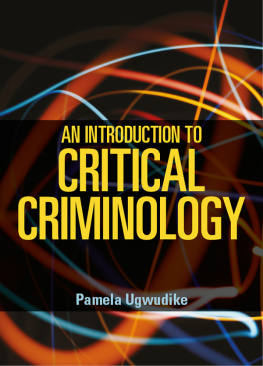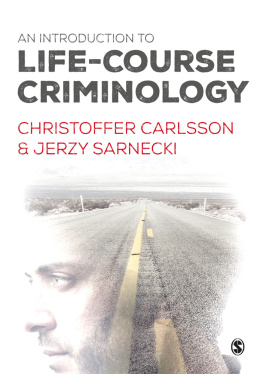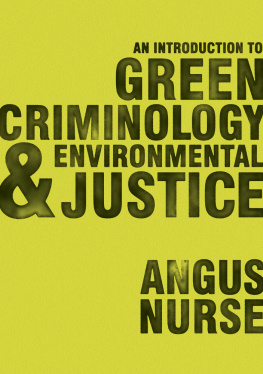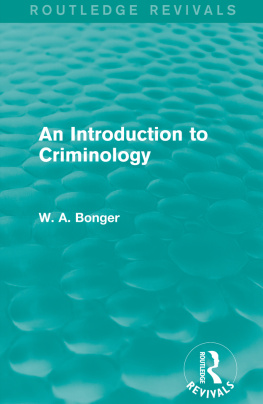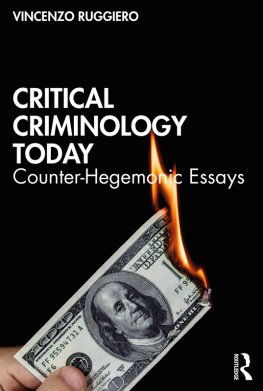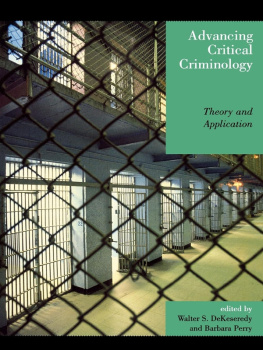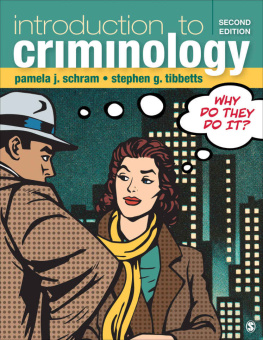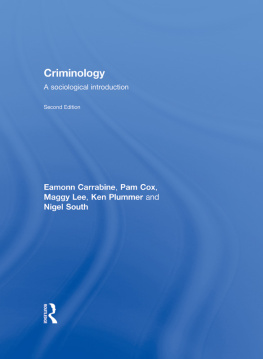First published in Great Britain in 2015 by
Policy Press University of Bristol 1-9 Old Park Hill Bristol BS2 8BB UK Tel +44 (0)117 954 5940 e-mail
North American office: Policy Press c/o The University of Chicago Press 1427 East 60th Street Chicago, IL 60637, USA t: +1 773 702 7700 f: +1 773-702-9756 e:
Policy Press 2015
British Library Cataloguing in Publication Data
A catalogue record for this book is available from the British Library.
Library of Congress Cataloging-in-Publication Data
A catalog record for this book has been requested.
ISBN 978-1-4473-0961-1 ePub
ISBN 978-1-4473-0963-5 Kindle
The right of Pamela Ugwudike to be identified as the author of this work has been asserted by her in accordance with the 1988 Copyright, Designs and Patents Act.
All rights reserved: no part of this publication may be reproduced, stored in a retrieval system, or transmitted in any form or by any means, electronic, mechanical, photocopying, recording, or otherwise without the prior permission of Policy Press.
The statements and opinions contained within this publication are solely those of the author and not of The University of Bristol or Policy Press. The University of Bristol and Policy Press disclaim responsibility for any injury to persons or property resulting from any material published in this publication.
Policy Press works to counter discrimination on grounds of gender, race, disability, age and sexuality.
Cover design by Double Dagger
Front cover: image kindly supplied by Photodisc
Readers Guide
This book has been optimised for PDA.
Tables may have been presented to accommodate this devices limitations.
Image presentation is limited by this devices limitations.
Introduction
An Introduction to Critical Criminology introduces students to key perspectives in critical criminology. As a field of study within criminology, critical criminology comprises several perspectives that emphasise disparate themes. Collectively the perspectives criticise mainstream criminological theories on several grounds. In addition, most of the perspectives assert that the origins can be traced to unequal power dynamics, and other inequalities in society, which can expose the less powerful to criminalisation, and sometimes to victimisation.
Many criminology textbooks do not pay sufficient attention to critical criminological perspectives. In the UK, textbooks that include sections on critical criminology often confine themselves to descriptions of dated perspectives. Thus the textbooks typically discuss the foundations of critical criminology peremptorily, alongside other criminological theories. In the US, the situation appears to be the same. As DeKeseredy (2010: 18) rightly observes:
one area that is consistently given poor treatment is critical criminology. Some texts simply ignore this side of the field. Others give extensive coverage, perhaps an entire chapter, but limit themselves to ancient intellectual battles and detailed coverage of long-discredited leftist theories.
An Introduction to Critical Criminology aims to address the paucity of accessible introductory texts on the subject. The text seeks to provide a reliable analysis of the foundational perspectives in critical criminology that emerged in the 1960s and the 1970s. It also explores additional critical criminological perspectives that have emerged since the 1970s.
The UK and the US are often cited as the birthplaces of contemporary critical criminology (Sparks, 1980, cited in DeKeseredy and Dragiewicz, 2012: 3). Other writers dispute this claim. For example, van Swaaningen (1999: 6) points out that if we are to believe the handbooks, criminology is a discipline of dead Europeans and living North Americans. Most texts on the subject do, indeed, focus on insights from the UK and the US. An Introduction to Critical Criminology deviates from this trend. The text presents insights from jurisdictions across Western Europe and America. This is because it is important to acknowledge that the work of writers in Europe influenced some of the foundational theorists in the field (van Swaaningen, 1997). Furthermore, contemporary critical criminological perspectives have emerged across Europe. As Schwendinger and colleagues (2008: 55) correctly observe, perspectives that are underpinned by ideas that are associated with critical criminological perspectives exist not only in the UK and in North American jurisdictions such as the US and Canada, but also in Australia, Norway, Italy and Germany (see also DeKeseredy and Dragiewicz, 2012).
in industrial capitalist societies; the Italian writers Dario Melossi and Massimo Pavarini (1981), and Alessandro DeGiorgi (2007), who have more recently explored the political economy of punishment in advanced capitalist jurisdictions. The text also introduces readers to critical perspectives that have emerged from the work of European scholars even if they do not necessarily identify themselves as critical criminologists. These scholars include the French (post-)structuralist Michel Foucault (1977), the Norwegian penal abolitionists Nils Christie (1981; 2000; 2004) and Thomas Mathiesen (1974; 1990), and the Dutch abolitionist Willem de Haan (1991; 2010).
Critical criminology is now an essential component of criminology, criminal justice and sociology courses in many universities in the Western world and beyond. Many students of law, social policy, and other social science subjects also undertake modules on critical criminology. It is hoped that An Introduction to Critical Criminology will serve as a useful learning and teaching resource for students and academics in diverse disciplines.
Indeed, An Introduction to Critical Criminology has an avowedly pedagogical agenda. At the end of each chapter, there is a list of key points that summarise the themes covered. Each chapter also contains questions that can serve as guides for essay preparation. In addition, some of the chapters contain boxed-off sections that help illustrate the issues covered by the chapter more vividly. In sum, An Introduction to Critical Criminology aims to serve as an accessible text that introduces undergraduate students to key foundational and contemporary debates in critical criminology.
Outline of chapters
It is impossible to cover every critical criminological perspective in any one text. It is a field of study that is expanding quite rapidly. As DeKeseredy and Dragiewicz (2012: 6) note: critical criminologists have attended to a legion of topics and it is impossible to do them all justice in one book. Therefore, An Introduction to Critical Criminology confines itself to key perspectives that tend to populate module booklets designed for undergraduate critical criminology modules, and also the module booklets for theoretical criminology modules.
An Introduction to Critical Criminology comprises 13 chapters, which are divided into four thematic parts. introduces readers to the labelling perspective. The labelling tradition has been described as one of the foundational perspectives that launched critical criminology as a field of study. The chapter analyses the work of key proponents of the tradition, particularly the US sociologist Howard Becker (1963, 1967).
introduces conflict perspectives in criminology, with particular reference to the work of its key proponents, including Thorsten Sellin (1938a; 1938b), George Vold (1958), Austin Turk (1966, 1969) and Richard Quinney (2008 [1970]). Other key writers include William Chambliss and Robert Seidman (1971). These scholars have explored how the diversity of norms, values and/or cultures in any one society can create conflict between groups. The scholars argue that, ultimately, the group or groups that are able to assert their norms, values and/or cultures determine definitions of crime in that society.


